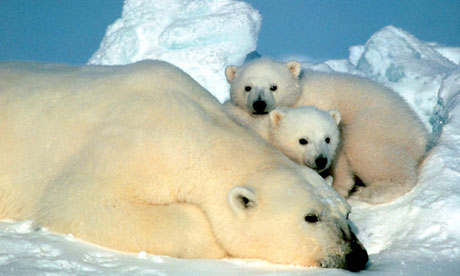Search Results for Tag: UN
Taking Back the Forest
 Are forests back on the rise? The latest study from the UN Food and Agriculture Organization (FAO) shows the rate of forest loss is actually slowing down, surprisingly enough. That's mainly thanks to a push to plant–rather than cut down–forests in Asia.
Are forests back on the rise? The latest study from the UN Food and Agriculture Organization (FAO) shows the rate of forest loss is actually slowing down, surprisingly enough. That's mainly thanks to a push to plant–rather than cut down–forests in Asia.
According to the State of the World"s Forests 2011 report, the rate at which the planet's forests are being cut down decreased from 8.3 million hectares a year between 1999-2000 to just 5.2 million over the last decade. And, the UN says the world's forest regions could even start expanding in the near future!
China has focused on a big reforestation project, which includes increasing the country's forested land area from 120 million to 200 million hectares. There's just one small problem, according to the FAO: a lot of that new growth will likely be "junk" forestation because it won't have the same carbon storage value as existing forests. Plus, a lot of valuable forest land is still being razed at a very high rate in South America and Africa.
What about in your region? Is your home country planting or cutting down–and have you noticed any changes?
The Year of Forests
As we ring in 2011, the United Nations is inviting everyone to celebrate the International Year of Forests. The UN wants to raise awareness about the importance of forests on our planet and educate people about the issues facing our forests today. And, organizers hope the year-long tribute will inspire people to take action and contribute to forest preservation around the world.
According to the UN, forests cover 31% of total land area on the planet and account for 80% of our terrestrial biodiversity. They also provide a home for more than 300 million people worldwide. And, an incredible 1.6 billion people depend on forests for their livelihood–from making and trading important products to farming, and so on.
You can find a detailed list of events and celebrations taking place across the globe on the UN's website. One of the major events will be the International Forest Film Festival that takes place at UN headquarters in New York in February. The festival features a series of international films that address different themes, like 'Living Forests,' 'Issues & Solutions,' and 'This is My Forest.' You can check out some clips from the finalists here.
Good news for polar bears?
 Well, yes, if a new study is to be believed… Researchers claim that the Earth's polar ice caps are not likely to melt as rapidly or irreversibly as previously thought. The polar bear can be saved from extinction – but only if action is taken quickly. Greenhouse gas emissions must be cut tremendously. The study was published in the journal Nature. Find our more about it here.
Well, yes, if a new study is to be believed… Researchers claim that the Earth's polar ice caps are not likely to melt as rapidly or irreversibly as previously thought. The polar bear can be saved from extinction – but only if action is taken quickly. Greenhouse gas emissions must be cut tremendously. The study was published in the journal Nature. Find our more about it here.Looking Back at Cancun: Part 3

Here's the third and final installment of Torsten Schäfer's commentary:
Europe Has to Take the Lead
It’s time for the major climate powers to sit down and set ambitious goals for fighting climate change. They have to capitalize on the important progress we saw in Cancun. If the major climate powers don’t lead the charge, smaller countries won’t follow along, and a new binding treaty–with strict emissions regulations–won’t even be possible in Durban. And that’s why the European Union has to take charge. It doesn’t look like any legitimate climate or energy legislation will come from the U.S., especially since Obama’s Power Act failed to gain traction in Congress. It’s highly unlikely that the Environmental Protection Agency (EPA) will have the power to push forward significant climate legislation on its own. And as the U.S. goes, so does China in this case. Beijing has continuously made it clear that China will make no major commitment to fighting climate change if the U.S. doesn’t step up to the plate as well. That would cause a domino effect, and other major consumers like India and Brazil would also balk.
So the EU is left to carry the burden. Europe has proved in the past that it’s capable of coming through on ambitious environmental goals and programs. But in the last 2 years, as leading climate negotiators have dug in their heels, the EU too has hesitated, stalled and showed reluctance. That became evident in Cancun. Europe’s visionary climate programs have fallen by the wayside amid a financial crisis and infighting.
The fact that the EU lacks a strong leadership figure like former Environment Commissioner Stavros Dimas in Brussels is part of the problem. But German Chancellor Angela Merkel’s refusal to take the lead has also complicated things. Like France, Germany has started to express skepticism and discord in European politics, crippling Europe on the international stage. And this at a time when the EU is needed more than ever to lead climate talks.
In other words, the EU can only take control of global climate negotiations when it learns to speak with one voice. And in order for that to happen (and in order for Durban to be a success), Europe has to return to its values and its vision of integration across all platforms, including environmental protection. Angela Merkel and Nicolas Sarkozy have the power to bring about this change by going back to other member states and encouraging them to follow along. Only then will the EU win back its political power and its ability to lead a tough line on climate change. In the end, the success of climate legislation is tied closely to European politics. That’s an important lesson we can take away from Cancun.
Looking Back at Cancun: Part 2

Here's Part 2 of Thorsten Schäfer's commentary:
Moving Forward After Cancun
Cancún was a symbolic victory. The concrete details on climate policy still have to be hammered out. One example: the participating countries failed to come up with an answer to how environmental policies will be funded. It’s a crucial question that has to be addressed before any sort of climate agreement can even work. Another example: nobody knows what the terms of a new forest preservation program would include—or if it’ll end up being abused and ignored like the Clean Development Mechanism (CDM) from the Kyoto Protocol.
Under the CDM program, companies from wealthy industrial nations receive emissions certificates whenever they start new climate protection projects in developing countries. But what began as an incentive to protect the environment has turned into a multi-billion dollar industry. Some companies are raking in money from projects that have already existed for years or have little noticeable environmental benefit.
If international leaders don’t make forest preservation a top priority, some environmental organizaitons worry we could end up right back where we started. Just picture this scenario: you could have huge companies making a lot of money by clearing out naturally existing habitats and planting giant monocultures. On the surface, it would look like the company is adding to the region’s vegetation. But in reality, a monoculture would store far less CO2 and wouldn’t have nearly as much biodiversity as the original habitat. This could all be avoided if negotiators draw up strict forest preservation guidelines at the Durban summit next year.
But much more still needs to be done in Durban. Like actually formalizing the agreement to keep the rise of global temperatures under 2 degrees. Also, both the USA and China have to be bound to any new treaty. The decision to simply extend the Kyoto Protocol terms was a mistake because it allowed both world powers to remain outside the loop. And all sides need to address the gap in legislation when Kyoto expires. Ratifying a new treaty can take decades, and international leaders will have to come up with a sensible way to bridge that gap.
Cancun was a success simply because it left so many questions unanswered. Mexico’s foreign minister Patricia Espinosa was only able to gather so many countries around one table because they weren’t bound to any specific evironmental legislation. Now, the pressure lies squarely on the Durban talks next year.
Stay tuned for Part 3 tomorrow!









Feedback